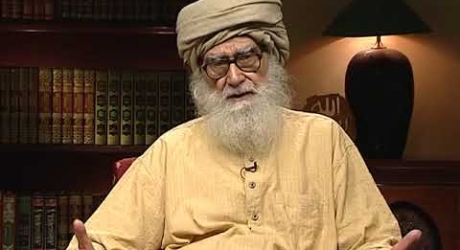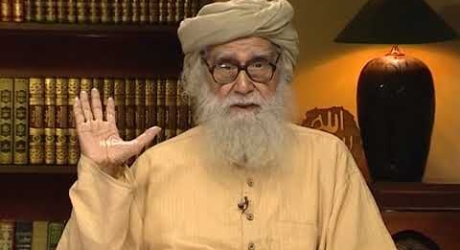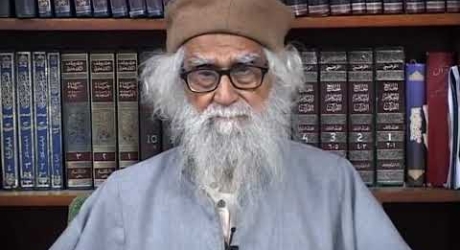For the conveyance of God’s message to people after the last Prophet, the faithful followers of the Prophet were assigned the role. It is the task referred to in the Quran as ‘calling people to God’. This duty involves conveying the message with beauty and wisdom and without any compulsion as per the Quranic commandments. Those who take up this divine task must bear in mind that:
• God has no special relationship with any particular community.
• As this work is the task of representing God, it has to be performed with meticulous care and accorded to the highest moral standards which it demands.
• Well-wishing and complete goodness is expected of an earnest undertaker of this task.
• The traits of the one who conveys the message to others should be of a wholly peaceful and non-materialistic person. Such a person should be wholly positive and one who contributes to the constructive activities of the world.
Muslims should now shun all such activities, and if they claim to be the faithful followers of the Prophet, they must emulate the Prophet in their lives. The fundamental mission of the Prophet was to convey the message of God to man, and Muslims, as followers of the Prophet, cannot afford to ignore this mission. Their activities must centre on conveying the peaceful message of the Quran to humanity. Like the Prophet, they must live a noble life that involves being God’s worshipper and man’s well-wisher. This is the vision and the mission of Islam.
Featured Articles
Featured Videos
FAQs
God said in the Quran, “Who speaks better than one who calls to God and does good works and says, ‘I am surely of those who submit?’ (41:33).
According to this verse, the Muslim Ummah has a two-fold mission— to practice Islam and to convey to people the divine message of Islam.
The mission of Muslims is dawah or the communication of the Word of God. It is in its performance that they will be held deserving of being raised in the Hereafter as the followers of the Prophet of Islam. This is expressed in the following verse of the Quran:
“O Messenger, deliver whatever has been sent down to you by your Lord. If you do not do so, you will not have conveyed His message.” (5:67)
Although this verse is addressed to the Prophet Muhammad, his followers are included in it. The first thing that this verse tells us is to convey the divine revelations to the people. This is the task which God wants Muslims to perform. According to the Quran, God has made the Muslims a middle nation, so that they may act as witnesses over mankind, and the messenger may be a witness for them. (2:143). This status of Muslims has been explained thus in a hadith:
“You are God’s witnesses on this earth.” (Sahih Al-Bukhari, Hadith No. 1367)
It is a known fact that when a person is appointed to any position of responsibility, his future depends on how well or badly he carries out the duties which that post entails. If he satisfactorily performs the duty for which he has been appointed, he will be held deserving of all kinds of rewards. But if he neglects his duty, no other work done, even if it is on a larger scale, will make him deserving on any honour in the eyes of his Creator. In this matter, Muslims must pay heed to this warning which was given to the previous people of the Book, when they stopped conveying God’s message to mankind:
“God made a covenant with those who were given the Book to make it known to people and not conceal it. But they cast it behind their backs and bartered it for a paltry price: what an evil bargain they made! Those who exult in their misdeeds and love to be praised for what they have not done should not suppose that they are secure from punishment; they shall suffer a grievous punishment.” (3:187-188)
The Muslim Ummah, which is the bearer of the Divine Book, becomes valueless in the eyes of God when it fails to convey the Divine revelation to the people. Engaging in other activities at the cost of preaching God’s word and wrongly designating other activities as dawah work is adding insult to injury. No such group can ever be held deserving of any credit for carrying out the Divine task.
Source: Spirit of Islam October 2013
God has created man in freedom, but this freedom is not unlimited. The freedom of the individual is taken away at death. And the freedom of the whole human race will be taken away on Doomsday. After the cessation of life in this world, a new life will begin in the Hereafter. There people will be divided into two groups: one who, having made proper use of their freedom, making it subservient to the will of God will enter into Paradise; the other group will be of those who, having been fearless of God in using the freedom granted to them, will be sent to Hell. This division will be eternal: the people of Hell will remain eternally in Hell, whereas the people of Paradise will remain in eternal bliss.
This means that about a hundred years of life in this world is going to end in an eternal fate for humans. And the end will be either a terrible punishment or the greatest of rewards. This state of affairs makes the matter of life extremely grave. Despite this extraordinary gravity, all realities remain hidden from human eyes. God, the angels, paradise, hell—nothing is visible. As such, it was expected from man that when these realities were revealed, he would say, “God, I did not know that this was going to be the end of life. Why did You not tell us before?”
In view of the delicacy of this situation, God made an arrangement whereby, with the very creation of the first man, He began sending prophets to the world. In fact the very first man was also the first prophet. The prophets were sent revelations so that they could convey the divine message to mankind. This series of prophets continued from Adam to Jesus Christ. Finally God decided to send the Final Prophet to whom He would send him the last divine book which would be preserved for all time. This event in the seventh century ushered in a new age in human history, subsequent to which the Book of God was to remain in preserved state and no further prophets were to be sent by God.
Then the question arises as to what arrangement was made by God for conveying the Creation Plan of the Creator for all the human beings who are born after the cessation of prophethood. The community of the followers of the Prophet Muhammad, the final prophet of God had the onus of conveying in full the divine message to the people. Subsequently these people were charged with conveying the divine message to every generation till Doomsday, so that when the case of these people was presented before God on the Day of Judgement, the followers of the Prophet might stand up and say that they had conveyed the divine message to the people, and that in spite of this, they had not accepted it, and were therefore themselves responsible for their actions.
This is the task that has been referred to in the Quran as ‘calling people to God.’ It is an obligation devolving upon the followers of the Prophet. They can in no way be exempted from performing this task.
No amount of individual worship will save them from God’s chastisement. If the followers of the Prophet do not perform this task of conveying God’s message to the world, they too will be held accountable along with other communities in the Hereafter. If the other communities or peoples committed the wrong of not adopting a life in accordance with Quranic principles, the Muslims will be held responsible for not having conveyed God’s message to them. The second case is in no way of a lesser degree than the former.
Source: The Vision of Islam
Muslims today have to perform for the benefit of the world the same duty of calling people to God, as was performed by the prophets for their communities. This is a duty which involves conveying the message of the Quran to them. Just as without the payment of zakat all the wealth of a person remains unlawful to him, similarly without performing this duty it is unlawful for us to spend our time and money on anything else. We can have no happiness or security until we devote ourselves to this cause. Some points to keep in mind for this are as follows.
The only thing that man can do is to convey God's message to other humans with full kindness and clarity. It is not within the purview of a dayee to change one's thoughts or religion. As clearly said in the Quran:
“if they turn away, We have not sent you [O Prophet] as their keeper: your responsibility is only to convey the message.” (42:48)
Although this verse is for the Prophet, the Muslim Ummah is also included in this order in following the Prophet.
This work does not simply involve making speeches and writing books, but is rather the task of representing God. It has to be performed with the meticulous care and according to the highest standards which it demands. We have to do it with the same utmost sincerity and seriousness with which a government official conveys an important message entrusted to him.
Well-wishing and other demands as are expected of an earnest undertaker of a serious task, have to be combined together while performing this work. Moreover, it is also essential that the Hell of which one is going to warn people be a cause of great apprehension for one’s own self, and one be oneself extremely desirous of the Paradise whose glad tidings one is conveying to others. If one’s preaching or dawah work is not marked by these characteristics it would be ludicrous to even think of undertaking it.
Source: The Vision of Islam
There is a verse in the second chapter of the Quran that says, “We have made you a middle nation so that you may be as witnesses against mankind, and the Messenger may be a witness against you.” (2:143)
The word witness (shaheed) in this verse refers to the role of Muslims as dayees. By saying that the Messenger will be a witness against us, it signifies that the Messenger is the witness that the divine religion was given to us, and that we will have to bear witness that we communicated the same divine religion to the rest of humanity. It follows that it is now our duty to communicate God’s message to every person of every generation in every age.
It was the responsibility of the followers of the Prophet to pass on the message they had received from the Prophet to others. The same responsibility was given to the ancient peoples of the Book — the historical people of Moses, and those of Jesus. In the Quran, making the message of God clear to people is called tab’iin. (3:187)
This task of being a witness, or dawah, is not mystical in nature. It is also not a mark of superiority. It is a heavy responsibility, greater than all other responsibilities, commensurate with the great gift of faith. It is also a greater responsibility than that given to the followers of previous prophets because the Prophet Muhammad was the last prophet. Until the Day of Judgement, it is the sole responsibility of Muslims to convey the message to other people. It is thus not only our responsibility to inform others of the message, but also to convey it in a manner that is clear, open, understandable and that will make a deep and lasting impression of truth, peace and spirituality on their minds.
Only by fulfilling this responsibility of dawah can we be held eligible, in God’s eyes, to be called the Middle Nation.
Source: Spirit of Islam September 2013












